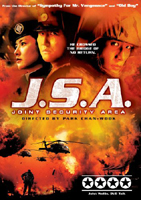 BUY IT AT AMAZON: CLICK HERE!
BUY IT AT AMAZON: CLICK HERE!
STUDIO: Palm
MSRP: $24.99 RATED: Unrated
RUNNING TIME: 109 Minutes
SPECIAL FEATURES:
• Cast and crew interviews
• Behind-the-scenes featurette
• Original Korean trailer
• Music video
• Trailers for other Palm features
• DVD-ROM weblinks
Park
Chan-wook is justly famous these days for directing Oldboy, his third
feature. Oldboy is part of Park’s Vengeance Trilogy, which was begun in
his second feature, Sympathy for Mr. Vengeance. JSA (unrelated to the DC
comics) is a completely different animal from either of those films. Where they
explore various degrees of burning revenge, JSA examines a much more
collected set of characters, and is concerned with brotherhood, friendship and
redemption (or the lack thereof).
The
screenplay is a quietly stunning examination of characters on both sides of the
demilitarized zone between North and
other as human beings rather than as representations of an opposing ideology.
Park makes few overt missteps in his direction of the screenplay, and those the
viewer does pick up on are in the service of his education as a filmmaker.
The Flick
JSA is divided neatly into three equal
sections. In the first section, Major Sophie Jean (Yeong-ae Lee) arrives in
Neutral Nations Supervisory Committee. The NNSC has been called in to discover
the cause of a minor scuffle across the titular joint security area which
resulted in the deaths of two North Korean soldiers.
As Major Jean
reviews the depositions of the surviving soldiers, the film takes on a Rashoman-esque
structure, displaying the actions that each soldier has claimed took place. The
depositions are not in total agreement. The South Korean soldier, a
well-respected sergeant named Soo-hyuk Lee (Byung-hun Lee), maintains that he
was kidnapped by the North Koreans, and then managed to escape. The North
Korean soldier, Sergeant Oh (Kang-ho Song), swears that Soo-hyuk crossed the
border of his own free will, with the intention of killing the North Koreans.
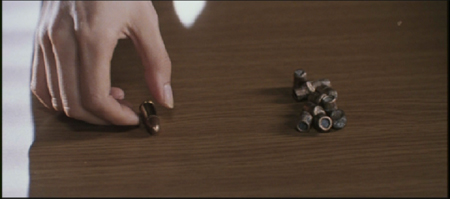
You’re not a man until you can do it with your fingers.
Something
doesn’t match up, so Major Jean digs deeper, uncovering inconsistencies in the
physical evidence. Soo-hyuk’s beretta held fifteen rounds in its magazine;
sixteen shots were fired on the dead Korean soldiers. With the mystery of the
missing bullet as her guide, Major Jean confronts both Soo-hyuk and his
subordinate,
the South Korean guard post.
Here, the
narrative rewinds as Soo-Hyuk recalls the events leading up to the night in
question. The second act is told entirely in flashback, starting at a point
several months before the night of the firefight. Over a series of hesitant
communications, a friendship kindles between Sergeant Oh and Soo-hyuk.
This act
is the heart of the film, the source of all the connection between the audience
and the protagonists. It was daring for Park and the writers to wait for so
long before building that connection, but it works seamlessly. In the first
act, the audience is captured by the mystery; in the second act, they are held
by the interplay between the two friends.
The two
soon become three, as Sergeant Oh’s subordinate starts to feel friendly toward
the capitalist Soo-Hyuk. Then Soo-hyuk brings Private Nam across the bridge to
the North Korean guard post, and the four begin to bond. They play games, talk
about girls, speak idly of their respective ideologies. There was a danger, at
this point, for South Korean Park to descend into propaganda favoring his side,
but there is none. The politics are kept at a distance; the characters are as
uncomfortable with it as the viewers are whenever talk of defection or
political gain is brought up in conversation.
Sadly,
the politics are important, inasmuch as they are represented by the other
soldiers on both sides of the line, the soldiers who see their opponents as
nothing more than enemies, puppets. The friendship, like that of any illicit
lovers, is doomed to fail. The second act comes to a brutal close as the
mystery of what exactly happened that night is revealed to the audience.
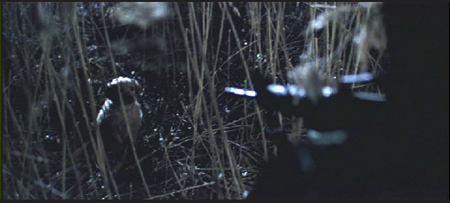
Soo-hyuk preferred cat, but this would do.
The third
act returns to the investigator’s frame story, and, again, the transition is
smooth. Now we see much more than simple reticence on Soo-hyuk’s face with
Major Jean asks for the truth. The unlikely friendship between Soo-hyuk and
Sergeant Oh carries with it an odd loyalty, a fragile desire to protect the
other from whatever fallout lies in wait, and a personal sadness that easily
tops that of either Romeo or Juliet.
That’s
not an idle comparison. There is much in the second act that resonates like a
love story. There’s the hesitant first overtures, the long nights of
conversation, giddy playfulness, honesty and occasional mistrust. These men
begin to treat each other like — and call each other — brothers. The third
act divides that brotherhood more cleanly than a guillotine. Except for the
very last shot, there is no reminder in the third act of those fleeting few
months of happiness, and it’s all the more heartbreaking for it. Park spends
enough time with the regret, with the fallout, that it becomes just as real,
takes on just as much weight as the second act.
The
conclusion is a lament for the sense of belonging. Soo-hyuk is unable to live
with himself as a South Korean man, a man defined by his nation. Sergeant Oh returns
violently and irrevocably to his role as an ideological figurehead, though his
motivation for doing so remains ambiguous. Even Major Jean, who develops into a
worthy character of her own, finds out a little something about her history
that puts her objectivity in jeopardy.
The
strands of friendship, torn loose by the night of the murders, remain loose
through the end. Park gives the resolution of the film, especially, an
observational tone; there is no judgment, there is no redemption. I felt that
this was because JSA is focused entirely on the characters, and the actions they
perform. There are no devices of plot throughout the building of the drama, and
so such an external device would have destroyed the ending.
The
screenplay is free of such devices, but the director’s choices betray too much
of a love of gimmickry that undermines some of the drama. Park makes heavy use
of unusual fields of focus, of unconventional camera motion, odd bits of
slow-motion and frame-removal. Many of the scenes feel like a man playing with
his post-production toolbox. Occasionally, these choices are distracting, but
more often they are in support of the drama and easily written off. I’m glad
for Park’s experimentation with the medium; here, it may not work perfectly,
but he has refined his sensibilities since JSA, and one of the results is the
iconic hallway fight in Oldboy. Here, he seems ravenous to
experiment, less deliberate.
The end
result is still a film worthy of respect. It gets downright beautiful at times,
and there’s as much character invested in the moments of tension as there is in
the moments of peace. As a study of friendship, JSA runs the gamut. Maybe
there’s not as much to say on the topic; after all, Park didn’t feel the need
to make a trilogy about this sense of brotherhood. But from the perspective of
this reviewer, there’s not much else that needs
to be said.
8.5 out of 10
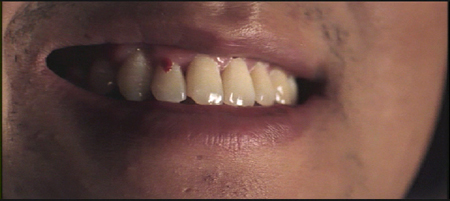
"Hang on, you’ve got a bit of cat there…"
The Look
2.35:1
widescreen. The transfer is clean and serviceable. There are many sequences
that take place at night, and the blacks are in good contrast to the brighter
points of interest.
One bit
of Park’s style that doesn’t get overshadowed by his knack for experimentation
is his grasp of framing. He and his cinematographer, Sung-bok Kim, make heavy
use of nature to contain their actors, giving a definite sense of reality to
the spaces they inhabit. Individual shots are certainly beautiful; there is a
sequence in an overgrown field that is both tense and haunting, due in part to
the otherworldly shine that was captured of the moon on the stalks of wheat.
My only
complaint about the look is the occasional distracting CG. There aren’t many
scenes that are CG-enhanced, but those that are stand out like Batman jumping
off a building.
8.0 out of 10
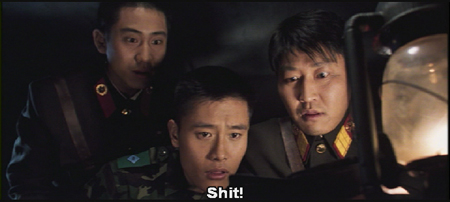
As one, the three soldiers realized that they had each slept with Pvt. Nam’s sister.
The Noise
5.1 Dolby
Surround. The dialogue is presented with two options: English dub, or the
Korean original with English subtitles. I recommend the Korean track, but for
those uncomfortable with reading their movies, the English dub is serviceable.
My major complaint about it (apart from the words not matching the damn lips)
is that the actor used to dub Soo-hyuk has a lower pitch than it seems he
ought. I never got used to it.
The
directional sound is clear and crisp, with a presence that I didn’t expect.
There is a lot of warmth to the soundtrack, the dialogue, and the ambient sound
that makes the whole aural side of things feel full.
The music
choices are forgettable but serve their purpose, including several bits of
classic Korean vocal music. The score is moody and, particularly during the
first and third acts, sounds a bit like a Mark Snow composition for The
X-Files.
7.3 out of 10
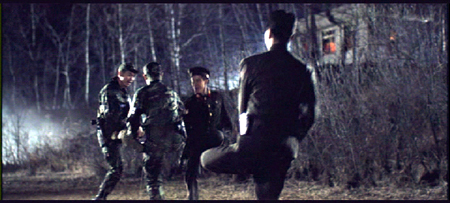
Sergeant Oh always wanted to play Dufflepuds.
The Goodies
First off
is an informative set of question-and-answer sessions with the principal actors
and the director. Far from the marketing interviews that we see on our American
stations, these are full of thoughtful questions and reasonably thoughtful
responses, across the board. Of special note is the interview with Park, who
communicates clearly and intelligently, giving insight into his filming
techniques and theories.
There is
a behind-the-scenes featurette that lasts for about thirty minutes. Humor is
well-evident in the filming process; Park seems almost light-hearted, at least
in tone, when addressing his occasionally wayward actors. It’s a good little
feature, with more content than these tend to have.
The
remaining extras are throwaways. There’s the original Korean trailer, which
bills the film as a tragedy. There’s a music video (featuring an indeterminate
performer singing over clips from the movie). There are previews of other
releases from Palm, and there are weblinks to Palm’s website, and to a site for
the JSA
DVD.
5.0 out of 10
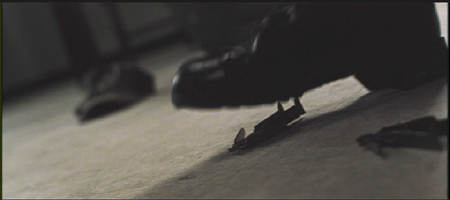
The Gingerbread Man, caught at last.
The Artwork
The cover
is dreadfully misleading. The dramatic heads float above a scene that doesn’t
even remotely relate to the content of the film. There are helicopters and
exploding huts on the cover, while there is maybe three minutes of combat
footage in the film itself. Glancing at the cover might make a potential viewer
think he was about to watch a war flick, instead of the cold war character
study he would actually be getting.
And the
tagline’s almost like a joke. "He crossed the bridge of no return."
Well, yeah, Soo-Hyuk kind of does do this, but it’s to play jacks with his
communist friends. How’s that for drama?
2.0 out of 10
Pick it
apart and put it back together, this is a film well worth watching, not just as
a step on the way to Park Chan-wook’s current output, but as a film in its own
right, powerful, haunting, and, unlike yours truly, subtle.
Overall: 8.0 out of 10